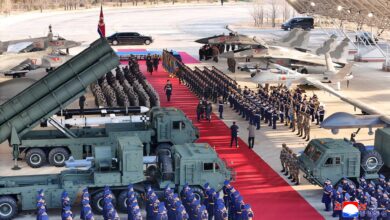The following happened in a guerrilla zone in December Juche 21 (1932) when the anti-Japanese armed struggle was waged vigorously.
At that time, the living conditions of the residents in the guerrilla zone were indescribable. They had not any food to prepare meals at once, to say nothing of the provisions for the coming winter, as they did not harvest the crops in time due to the “punitive operations” of the Japanese imperialists and many people moved from the enemy-controlled areas into the zone in order to escape from the massacre.
After acquainting himself with such situation, Commander Kim Il Sung called the officers of the guerrilla army and ordered that they should provide the people in the guerrilla zone with food for winter.
The commanders were amazed and worried about how to obtain so much grain. Looking around them, he said: It is by no means easy to obtain enough food for many people to winter. But they came to us as they trusted in our guerrilla army. How can we look with folded arms on them suffering from hunger? As fish cannot live without water, so the guerrillas cannot live without the people. Therefore, we should carry it through at any cost.
A few days later when the guerrillas came back after seizing foodstuffs from the enemy, he told them as follows: We guerrillas fight against the enemy at the cost of our blood for the sake of people. And we live on herb roots and tree bark in order not to cause troubles to the people as we love them. We communists should take good care of their living in the guerrilla zone even if we suffer hardships and hunger.
“As fish cannot live without water, so guerrillas cannot live without the people”, advanced by Kim Il Sung, was the mode of existence of the anti-Japanese guerrilla army and the principle of its activity.
True to his ideology of the army-people unity, the guerrillas strengthened the ties with the people, helped them with sincerity and fought devotedly for them. And the latter loved the guerrillas as their own flesh and blood and supported them at the cost of their lives.
The tradition of the army-people created during the anti-Japanese revolutionary struggle was one of the keys for the guerrilla army to emerge victorious in the war against the Japanese imperialists, even though it had neither state backing nor support from other countries.

